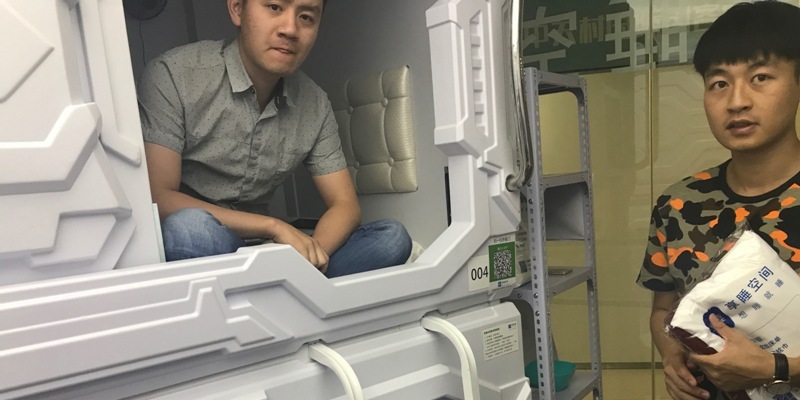Has this ever happened to you: You're at your job, arduously toiling away, when suddenly you have an urge to sleep? Miles away from home, no bed in sight, you woefully resign yourself to remain alert and conscious for the rest of the day – that is, unless there was some way to make comfy beds available to consumers at a low, affordable price.
Stop your daydreaming, and begin sleep dreaming: the bed-sharing market has finally arrived in Beijing.
The Sinosteel National Mall in Zhongguancun is the newest place in town to catch forty winks in-between your nine-to-five by providing private capsules for clients to sleep in.

Called "Sleepace," the company provides communally-used beds to its clients on a per use basis in much the same way products are shared in China's extremely lucrative share economy.
Sleepace currently has six share-beds available for rental, costing 6 yuan per half hour between the peak times of 11am and 2pm. Customers are charged a maximum RMB 58 per day, and unused time is refunded to the customer at a rate of RMB 1 per five unused minutes (of an hour).
Catered towards the area's white collar workers, the share-beds come under heavy demand when clients want a noon-time nap, work overtime hours and want a brief respite, or are simply too tired to go home and sleep. After starting up in June, Sleepace employees say customers are falling over themselves in order to get themselves a sleep capsule at the 24-hour service.

Measuring 90 centimeters across and two-meters-long, the sleep capsule are accessed by scanning a QR code on your phone which accesses an online payment service like Alipay. The personal sleeping quarters feature recharging facilities, a fan, and a reading light. Disposable bedsheets, pillowcases, blankets, and earplugs are available to customers.
A reporter for China Consumer Net visited Sleepace and offered positive remarks about the new venture. However, the reporter did note that the bed-shares suffered from a few problems: the capsules do not have any sound-proofing, the air inside is described as "stuffy" as well as having "a bad smell."


The reporter also witnessed a client try to enter a capsule only to discover it was already occupied.
Bed-shares are already being offered in Shanghai and Chengdu. The company plans to expand to other Beijing neighborhoods that include Wangjing, Beixinqiao, and Xidan.
We'll have to see if Beijingers take to bed-sharing for their napping needs. For others, a bed is wherever you lay your hat, as this viral photo of a local street sweeper from last week showed us:


More stories from this author here.
Twitter: @Sinopath
Images: Cameramanplay, CCN, Beijing 49 City, Weibo
